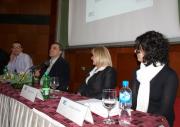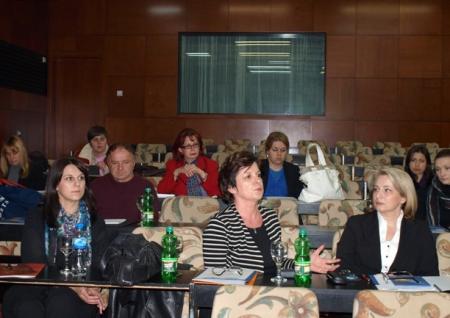Gender equality – challenges and key issues for the future
 Although they represent majority voters in BiH, women are still, to a considerably lesser extent, participating in the decision making processes at all levels of government. Lack of awareness in the society about the importance of equal participation of women and men in the political life of democratic BiH is discouraging. This was stated at the round table on the theme „Gender equality-challenges and key issues for the future˝ which was held in Tuzla, organised by Vesta Association and the Fridrich Ebert Foundation.
Although they represent majority voters in BiH, women are still, to a considerably lesser extent, participating in the decision making processes at all levels of government. Lack of awareness in the society about the importance of equal participation of women and men in the political life of democratic BiH is discouraging. This was stated at the round table on the theme „Gender equality-challenges and key issues for the future˝ which was held in Tuzla, organised by Vesta Association and the Fridrich Ebert Foundation.
Introducing the principles of gender equality in all walks of life and work represents fulfillment of one of the fundamental standards of human rights and basic freedoms. Equality and gender equality are not exclusively a matter of social justice, but represent a necessary condition for social and economic development of a country, with focus on poverty reduction and improvement of quality of life of all citizens in one society.
Participants of today's round table discussion included representatives of different political parties, members of the Tuzla Canton's Assembly, and NGOs ”.

According to Ms Suada Mujcinovic, member of the Tuzla Cantonal Assembly, position of a woman in BiH society is inadequate. Although the principle of non-discrimination on the basis of gender is guaranteed by the BiH Constitution, a comprehensive list of international instruments and conventions, the Law on gender equality, women in BiH are discriminated.
When it comes to women's participation in politics, Mujcinovic thinks that the time is surely coming in the democratisation of BiH, when women will show that, in addition to being successful in their professions, they can be just as successful in politics.
˝Unfortunately, women often do not represent interests of other women, but are more inclined to respect the patriarchal discipline, therefore they are not being recognised by women voters as representatives who fight for women's rights. Following the 2010 elections, one may say that a certain progress has been made and that there were more votes for female candidates. Six women were elected to the Cantonal Assembly, two more than in its earlier mandate. Sadly, there are no women in the Assembly's leadership, nor was any woman elected to the House of Peoples. It is encouraging that there are four women in the TK Government, two more than in the former government. In order for a woman to survive in politics when elected by the citizens, she must make efforts to justify their trust. Through her dedicated and properly balanced work, while remaining a woman, and fighting, as a matter of principle, for all issues that she is well aware of, a woman can contribute to the change of voters' perception, so that they vote for women more in the next elections. This will help improve the economic position of women in BiH, which is surely one of the reasons why they are discriminated˝, Ms Mujcinovic emphasised.
Researches which were carried out in BiH on the position of women point to the fact that women are insufficiently present in politics and public life, employed to a lesser extent than men, dicriminated against in the process of employment and at work, are an alarming number of victims of violence, and are traditionally more responsible for families.
˝We have many documents, conventions, laws on gender equality, but all of this represents a normative idealism that does not lead to addressing of the core of this matter. This occurence is complex, must be an integral element of constituents of one society, in order to overcome the stereotypes, because they are dramatic when it comes to this social phenomena. It is even more so if women themselves accept these stereotypes about their roles in the society, because then it becomes a social model of behaviour“, said Mr Srđan Vukadinović, sociologist, who also added:˝I think that it is primarily important to create an environment conducive to application of gender equality, i.e. a mental transition of conscience which we need. Once this becomes a reality, then we will not be talking about whether women want to be represented or not, but rather how many of them are capable, educated, etc. No one is saying that things will be better if women get into political, educational, cultural or other structures, but there will be a difference, and that is what matters. Our society needs a different mentality, a different policy ˝. It is obvious that the problem of discrimination of women in BiH is one that the state will need to look into more seriously, if it truly wants to get closer to the EU.


